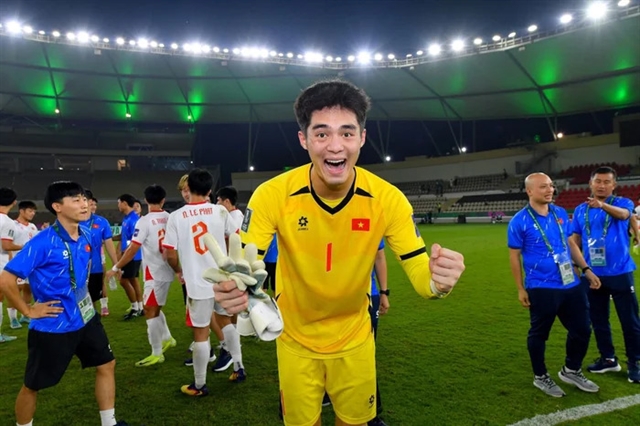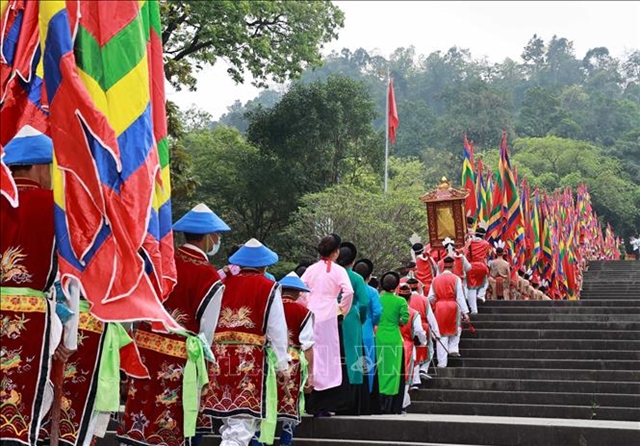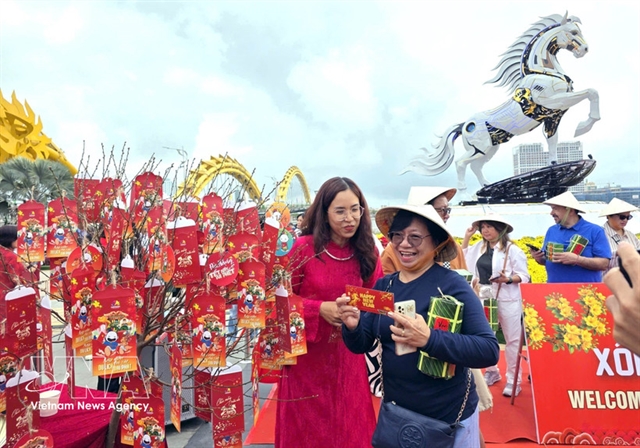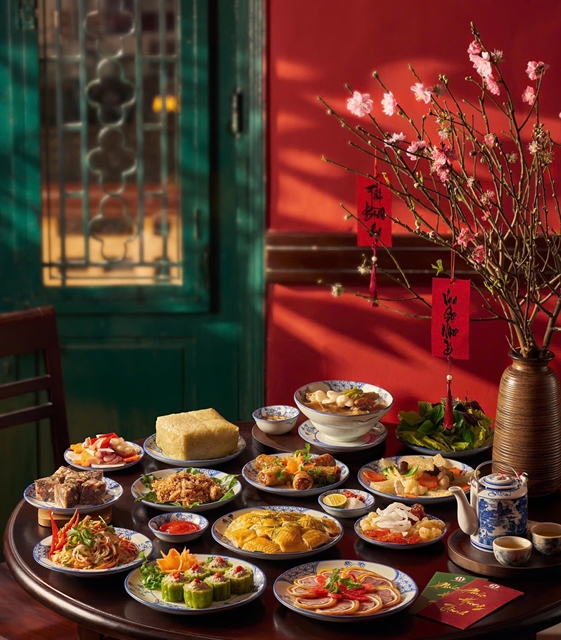 Sports
Sports

Anh Đức
 |
| The fireworks display outside Morodok Techo National Stadium marks the end to Cambodia's first ever SEA Games. — Photo AKP/VNS |
PHNOM PENH — After 11 days of competition, the 32nd Southeast Asian Games in Cambodia came to an end with a simple, yet splendid closing ceremony at the Morodok Techo National Stadium.
Minutes before the ceremony's start, spectators at Morodok Techo were treated to a magical light performance, as the whole stadium was lit up in purple.
Despite the drizzling weather earlier in the day, the stadium was filled.
The ceremony began with singers and all 11 flags of the participating countries held aloft, as the Cambodian officials were introduced.
A performance of "See you again" by famous Cambodian pop stars then followed, with thousands of dancers holding up lightsticks in blue, one of Cambodia's national colours.
Perhaps the most stunning performance came from a demonstration of Kun Bokator, a traditional martial art of Cambodia, recognised by UNESCO as an intangible cultural heritage 20 years ago, and brought to the SEA Games competition programme this year.
Hundreds of artists wore the traditional clothing of Kun Bokator and displayed their moves on stage.
After that, eleven sporting delegations took to the stage to wave their goodbyes in alphabetical order. An exception was Việt Nam, which was the leader of the total medal tally with 136 gold medals, marking the second consecutive time they have this honour.
A singer sang the official song of the SEA Games, as memorable moments of the games were displayed on screen. The montage ended with the image of Bou Samnang, a Cambodian athlete competing in the 5,000m running event in athletics.
In the event where Việt Nam's Nguyễn Thị Oanh won the gold medal, Samnang was running and weeping as she tried to finish the distance, having known her chance at the podium was over.
The image of Samnang went viral in Cambodia for her inspiring will to never give up. Samnang received praise from Prime Minister Hun Sen not long after the event, and was even invited to the stage of the ceremony.
Speaking at the ceremony, Deputy Prime Minister Tea Banh, Head of this SEA Games' organising committee, said that Cambodia has fully prepared to welcome the delegations, and tried their best to help athletes compete in the best conditions, contributing to a successful games.
Tea Banh then presented two awards for the two best athletes, one for the Singaporean swimmer Quah Ting Wen, who won 6 gold medals, and the other for Pal Chhor Raksmy, the Cambodian martial artist who won 4 gold medals in Vovinam events.
Prime Minister Hun Sen then made his speech on stage to formally close the games, before the flames at Morodok Techo were extinguished.
The flag of the Southeast Asian Games Federation was then taken down, and handed over by the Cambodian PM to a representative of Thailand, who will host the next edition of the SEA Games in 2025.
A display of fireworks ended the ceremony afterward, as "Cambodian Pride", the official song was sung proudly by the singers once again.
SEA Games 32 in Cambodia have indeed brought excitement to spectators, a prime example being the men's football final on Tuesday, which went viral on social media.
The closing ceremony was again proof of Cambodia's capabilities as a host and a great sum up of the whole games. A peaceful, simple ceremony is similar to this games' motto: "Sports live in Peace".
The eyes and expectations of fans will now turn to Thailand in two years, after 18 years of absence as hosts.
Vietnamese athletes enjoy best SEA Games in Cambodia
The 32nd SEA Games was considered the most successful event for Việt Nam as the delegation topped the medal tally in an away tournament.
Despite many challenges and difficulties, Vietnamese athletes pocketed 136 golds, 105 silvers and 114 bronzes and set 14 Games records.
It was the first time Việt Nam led the medal tally of the Games in two editions in a row.
"This was our best SEA Games result when competing away from home. Việt Nam stayed strong in the top position with 136 golds, which is much higher than our target," said Hoàng Quốc Vinh, head of the Elite Sports 1 Department of the Việt Nam Sports Administration.
"It is due to the great effort of all the athletes, coaches, officials foreign trainers, and staff," Vinh said.
Among the achievements, athletes earned high results in Olympic sports.
The women's team won the 3x3 basketball title for the first time.
Teenager Lê Khánh Hưng took Việt Nam's first title in men's individual golf. The 15-year-old and his young teammates also secured a silver in the men's team event. It was the highest result of the team in eight SEA Games.
Duo Đinh Anh Hoàng and Trần Mai Ngọc brought home a title in the mixed pair table tennis event after 26 years of coming up short.
Weightlifters scored four golds and four records. Wrestlers dominated in both men's and women's categories with 13 golds.
Judo martial artists achieved eight golds in both performance and combat events.
Athletics and swimming did not complete their missions. They could not repeat last year's outstanding performance.
According to Ngô Ích Quân, head of the Elite Sports 2 Department, there were several reasons leading to the results, including the disappearance of strong competitors due to doping problems and injuries that prevented athletes from competing at their best.
However, there were athletes that shone brilliantly. Nguyễn Thị Oanh won four golds in running in five days. Nguyễn Thị Huyền pocketed three golds and one silver, becoming the most successful runner at the SEA Games.
Swimmer Phạm Thanh Bảo won two golds and set two records. Teammate Trần Hưng Nguyên secured three golds, one silver and one bronze.
Vietnamese athletes also showed impressive performances in other sports.
The women's football team won the SEA Games trophy for the eighth time. They made history as the first team to win the title four times in a row.
Players also did a good job in unusual sports such as ouk chaktrang, kun bokator, arnis and kun Khmer.
"The achievements of Vietnamese sports at this SEA Games came from thorough, long-term and methodical preparation," said Quân.
"Athletes gathered for training camps after the 31st Games. Many of them were sent to practice locally and internationally for the best results," Quan said.
2025 SEA Games
Thailand will be the hosts of the next Games in late 2025.
The Sports Association of Thailand held a press conference on May 16 in Phnom Penh to announce basic information about the 33rd SEA Games.
The sports meet will be organised on December 9-20, 2025, in three main localities of Bangkok, Chonburi, 100km from the capital, and Songkhla, 1,000km from Bangkok.
The facilities for the competitions have been prepared, while further completion of transport infrastructure, hotels, means of transport, as well as other services at all locations, will be completed before the Games.
In the last 30 years, Thailand has hosted three big events - the 18th SEA Games in 1995, the Eighth Asian Games in 1998 and the 24th SEA Games in 2007.
Vice Chairman of the National Olympic Committee of Thailand Dato Seri Chaiyapak Siriwak said that the 33rd Games will be held under international standards.
Most of the competition programme would be Olympic and Asian Games sports. The organisers would minimise the unpopular and local sports. It will help to reflect the development of regional sports and push it to closer to Asian and world levels.
The number of sports and organising activities of the 33rd Games would be discussed between Thailand and the SEA Games Sports Federation in consultation with the 10 National Olympic Committees before the official announcement. VNS

.jpg)


